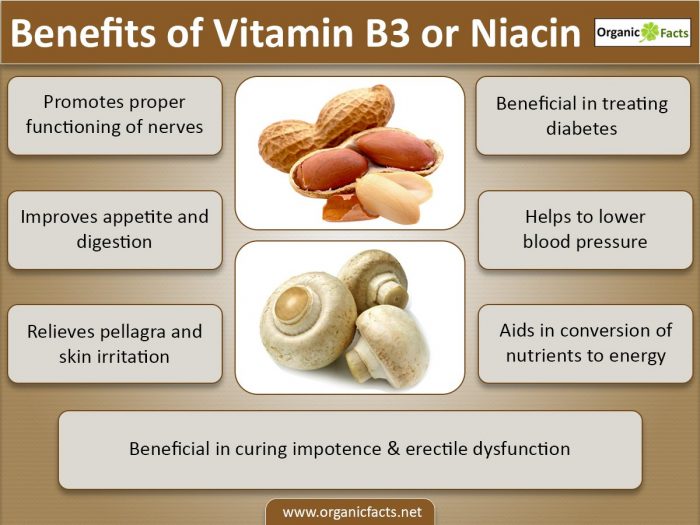The health benefits of vitamin B3, also known as niacin, include maintaining good blood circulation, healthy robust skin condition, normal functioning of the brain, boosting memory power, aiding the digestive tract to absorb sufficient carbohydrates, proteins, and fats, reducing the effects of arthritis and improving the symptoms of schizophrenia. The most important benefit, however, is its ability to lower cholesterol levels.
What is Vitamin B3?
Vitamin B3, also known as niacin, is a water-soluble vitamin. It helps to keep your digestive tract, skin and the nervous system healthy. There are many other names and derivations of niacin including nicotinic acid, nicotinamide, and nicotinamide riboside. [1]
Important Food Sources of Vitamin B3
According to the factsheet by National Institutes of Health, niacin can be found in meat, turkey, tuna fish, eggs, poultry products, curds, brewer’s yeasts, peanuts, legumes, potatoes, cheese, brown rice, oats, barley, wheat flakes, and milk. Foods like bread and cereals are also rich in niacin. Even tryptophan-rich foods like yogurt and eggs can boost niacin levels. Foods such as fish, nuts, dried grains, liver, chicken, lean red meat, whole grains, enriched refined grains, and dried beans are good sources of vitamin B3. [2]
Vitamin B3 releases energy into the body’s cells, but it is primarily used to lower high cholesterol levels. You may get niacin in supplement stores, but it is always sensible to buy it when specifically instructed by a doctor.
Vitamin B3 and its various forms are popularly used as therapeutic vitamins to relieve many ailments. It is also used to treat respiratory or vascular disorders, and as an effective dietary supplement for treating pellagra, along with Lovastatin. It mainly comes in 3 forms, which include nicotinic acid, niacinamide, and inositol hexaniacinate as supplement tablets or doses. Nicotinic acid helps to reduce high blood cholesterol levels, whereas niacinamide may be found in nutritional supplements. However, those benefits are just the tip of the iceberg.
Health Benefits of Vitamin B3 or Niacin
Vitamin B3 has numerous other health benefits, which mankind has slowly discovered over the course of many years. The beneficial properties are explained in greater detail below.

Niacin is a B vitamin that’s made and used by your body to turn food into energy. Photo Credit: Shutterstock
Improves Digestion
Niacin aids in the normal functioning of the human digestive system, promoting a healthy appetite, properly functioning nerves, and glowing skin. [3]
Treats Pellagra
Vitamin B3 deficiency can result in pellagra, which is characterized by digestive problems, skin inflammation, and mental health problems. A diet including foods rich in niacin can help these people, according to NIH. [4] [5]
Reduces Cholesterol Levels
Intake of niacin-rich foods has been proven to considerably reduce the levels of bad LDL cholesterol and raise the good HDL cholesterol. This prevents the thickening of artery walls and conditions like atherosclerosis. [6]
However, a 2017 study also highlights that niacin therapy does not significantly help if someone is already at risk of suffering from cardiovascular diseases. [7]
Water-soluble Vitamin
Niacin is a water-soluble vitamin that can travel through the human bloodstream and the body has the option to discharge an excess of such vitamins through the process of urination. Therefore, such vitamins may be administered to human beings through both food and liquid, since our body does need a constant supply.
Treats Erectile Dysfunction
Researchers at The Chinese University of Hong Kong have found in a 2011 research that niacin has the ability to improve the erectile function in individuals suffering from moderate to severe ED and dyslipidemia [8]
Provides Energy
Vitamin B3 performs the important function of converting proteins, carbohydrates, and fats into energy.
Improves Mental Health
Even mental derangement and associated conditions may be treated with the administration of niacin supplements or medicinal drugs.
Manages Type 1 Diabetes
Niacin is known to help manage type 1 diabetes and high blood sugar levels. According to an animal study at the Diabetes Research Institute at the University of Düsseldorf, Düsseldorf, Germany, treatment with a high dosage of niacin prevents or delays insulin-deficient diabetes in several animal models of Type 1 diabetes. [9] [10]
How Much Niacin do you Need?
According to MedlinePlus, here are the recommendations. [11]
Infants and Children
- 0 to 6 months: 2 milligrams per day (mg/day) (Adequate Intake)
- 7 to 12 months: 4 mg/day (Adequate Intake)
- 1 to 3 years: 6 mg/day (Recommended Dietary Allowance)
- 4 to 8 years: 8 mg/day (Recommended Dietary Allowance)
- 9 to 13 years: 12 mg/day (Recommended Dietary Allowance)
Adolescents and Adults
Males
- Age 14 and older: 16 mg/day
Females
- Age 14 and older: 14 mg/day
- Pregnant women: 18 mg/day
- Lactating women: 17 mg/day

Vitamin B3 is an important nutrient for keeping your digestive health at its best. Photo Credit: Shutterstock
Although it is rare to have a niacin deficiency that requires supplementation, modern society may actually benefit from supplementary forms of niacin to treat various body ailments. All three forms of niacin have different effects on the human body. Niacinamide has prominent anti-inflammatory contents, whereas nicotinic acid and inositol hexaniacinate may affect the circulation of the blood. You may use niacin or vitamin B3 supplements with regular meals or even in liquids.
Word of Caution: Niacin may have a drug effect when taken in very high dosages, and as always, it is best to consult a doctor or medical professional before taking any supplements or changing your diet in any considerable way.
